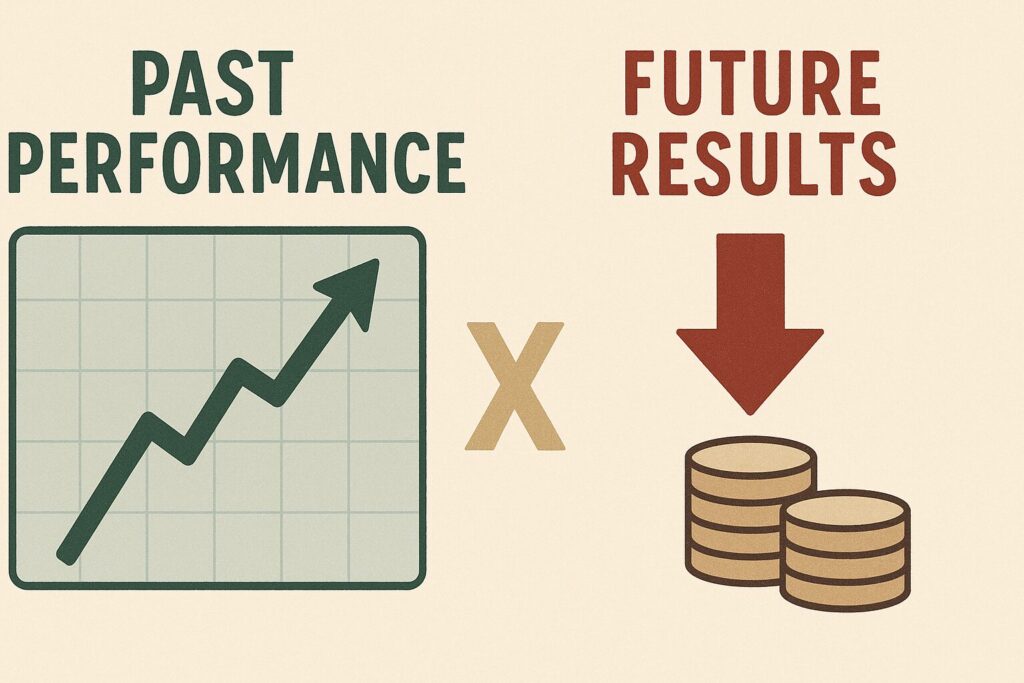
Why Yesterday’s Winners Can Lead to Tomorrow’s Disappointments
Welcome to “Money Myths Retirees Still Believe”—a blog series that uncovers the hidden beliefs that can quietly sabotage your financial peace of mind.
Many retirees cling to common money myths that seem true but can lead to poor decisions, lost income, or unnecessary worry. Each post in this series explores one myth—like “cash is trash” or “I need to beat the market”—and replaces it with a smarter, simpler mindset.
If you’re retired or nearing retirement, this series will help you reassess your approach and feel more confident about your financial future.
The Myth: “Past Performance Predicts Future Results”
Bob, a 71-year-old retiree, loved studying financial magazines. He felt smart, alert, and in control—especially when he picked investments based on their “Top 10 Funds of the Year” rankings. He moved some of his money into a tech-heavy mutual fund that had soared 28% the year before.
Twelve months later, that same fund lost 14%.
“How could it drop so fast?” Bob asked.
The answer? He’d fallen for a common and dangerous belief:
👉 That past performance predicts future results.
Why This Feels True (But Isn’t)
It’s tempting to look at the rearview mirror when investing. After all, if a stock, fund, or ETF did great last year—or for the past three years—it must be doing something right, right?
The reality is more complicated. Financial markets don’t work like a well-oiled machine. They cycle. They rotate. What goes up often comes back down.
Hot performers tend to:
- Attract a flood of money chasing more gains (which inflates prices).
- Get overvalued, meaning future returns are often lower.
- Fall out of favor when conditions shift or interest rates rise.
Chasing past winners is like betting that the horse who won yesterday’s race will win again today—without checking the weather, the track, or who else is competing.
The Smarter Mindset: “Focus on the Long Game, Not the Last Game”
Rather than looking at what did well, look at why something makes sense in your retirement plan.
For example:
- A dividend ETF that consistently pays income—even if it’s not the top performer.
- A bond ladder that matches your income needs—even if it doesn’t wow on a chart.
- A diversified portfolio that includes growth, value, international, and income assets—not just whatever did best last year.
Investing is not about finding the next big thing. It’s about building a mix of reliable, purposeful holdings that will get you through many kinds of markets—not just the best ones.
A Real-Life Example
Ruth, a 68-year-old retiree in Michigan, got caught up in the hype around high-flying tech stocks in 2021. A friend showed her a fund that had gained nearly 40%. She shifted part of her conservative portfolio into it—just in time for a major tech selloff.
The next year, her “winning” fund became her biggest loser. She called her son in frustration. His advice was simple: “Mom, stop trying to guess what’s next. Just build something solid and stick with it.”
That’s when Ruth stopped looking at past performance—and started looking at present needs.
A Quick Tip: Look at Risk, Not Just Return
If you do look at performance data, dig deeper. Ask:
- How much did this investment drop during tough markets?
- How consistent has the income been?
- Is this fund investing in solid companies or chasing trends?
- Do I understand how it works—or am I just chasing numbers?
Remember, risk-adjusted returns matter more than flashy past numbers.
The Takeaway
Just because something has performed well doesn’t mean it will.
The best retirement portfolios aren’t built on past trophies—they’re built on balance, income, and peace of mind.
Trust a strategy that matches your goals—not someone else’s scoreboard.